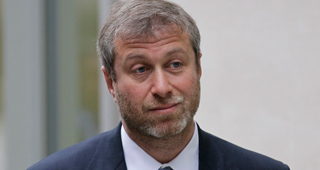Like the ghost of a dear friend dead is time long past and, man, thirty-two million bucks would buy you like one-fifth of a Didier Drogba these days. We’re coming up on fifteen years since Roman Abramovich assumed control of Chelsea and all those bandwagoners from José Mourinho’s first spell at the club now have kids the age Diego Costa looks. Abramovich hasn’t mellowed or grown less contemptible, but he has rivals in the oil baron/club owner sphere. He’s been normalized, you might say, and we tend to cotton slightly to villains if they stick around long enough. We’re used to Chelsea owning half the world’s promising young loan players, and we no longer worry about them ruining competitive balance in England or Europe. They’re dangerous like salt is dangerous, proof that you’re nouveau riche right up until the point you’ve been ruling class for longer than any of our internet-perforated brains can remember. Before 3G Wireless Was A Thing is basically forever anyway.
Chelsea are probably no longer capable of doing something that galls us. (For example, hiring Avram Grant and telling him to play entertaining soccer.) The apocalyptic anxiety that greeted Abramovich's first few spending sprees has given way to ho-hummy acceptance that, look, we guess that’s what Alvaro Morata costs in today’s market. Even Chelsea’s recent crises have been ordinary. Before Mourinho left the club a bombed-out village of discontent a year-and-a-half ago, he’d already done the same thing at Real Madrid, and before that he did it at—huh, Chelsea. Antonio Conte is one of the most interesting tacticians in Europe, and the way he’s married dynamic EPL athletes to a highly organized, deeply Italian 3-4-3 is ingenious, but he didn’t show up in West London relatively unproven like Jürgen Klopp to Dortmund or Diego Simeone to Atlético Madrid. You nab a few league titles with Juventus, while you’ve technically never hacked it on a cold and rainy night in Stoke, you’re expected to win a lot of games from day one. Conte was a logical hire, and it’s worked out beautifully so far.
Of course, you only shift the paradigm once, and from then forward what you’ve done rapidly comes to belong to everyone else. If you watch Marlon Brando in On The Waterfront, he looks big by being small. He’s surrounded by capable but comparably hammy actors communicating through what contemporary eyes read as exaggerated movements and expressions. The way Brando differentiates himself from the rest of the cast isn’t in the clips they play in Oscar retrospective montages. (It was you, Charley! is riveting. It’s also as actorly as he is in the entire movie.) It’s how he inhabits Waterfront’s in-between spaces. When Brando’s listening, he seems to sometimes not be listening. When he speaks, he weaves in and out of talking to his addressee and himself. It’s this drifting, this out-of-the-moment-ness he imbues his character with that lends him a special gravity and gives the viewer the impression he’s living while everyone else is just reading lines.
Nearly twenty years later, in The Godfather, Brando is equally magnetic, but he gives the Francis Ford Coppola masterpiece’s least naturalistic performance, rasping and grimacing his way through scenes, speaking and gesturing with almost painful, senator-like deliberateness. Brando contrasts strongly with Al Pacino and Robert Duvall, who are much more restrained and interior in their respective parts, not unlike Brando in Waterfront. A lot of what they say is behind their eyes. Brando as Vito Corleone, on the other hand, is shooting a grappling hook into your brow and swinging into you through your pupil. He’s not big by being small anymore. That’s too many other people’s thing by 1972.
Soccer clubs don’t tend to reinvent, once they reach the sport’s uppermost echelon, and the financial structure of the modern game entrenches power rather than dispersing it. But simply by dint of time having passed, Chelsea aren’t Chelsea anymore. Manchester City were Chelsea a few years ago. (Heavens, they’re going to buy up half the great players in Spain!) Then it was Monaco for a minute. (Falcao, João Moutinho, James Rodriguez, and Jérémy Toulalan in the space of a single summer.) These days it’s Paris Saint-Germain. (Capping years of expensive star-poaching by signing Neymar.) And with each iterative Chelsea, the cash-splashing becomes a little less gauche and outrageous and scary, even as the transfer fees and salaries soar. New Chelseas will continue to rise, but they’ll never quite be as Chelsea as Chelsea were.
As an actual club and not a symbol, Chelsea have been quiet(ish) spenders for the past few offseasons, but if Abramovich woke up tomorrow and broke the bank for, say, Antoine Griezmann or Kylian Mbappé, the decibel level of the fervor caused by it would be considerably lower than if the club had struck a similar deal in 2005. Because Chelsea are part of the establishment. Basically old money. Abramovich is the father of a popular style, like Brando.
Or like Hemingway, or Iverson, or Kant, or Joan Rivers, or George Lucas, or Didion, or William F. Buckley, or Future, or the progenitor of a meme that’s everywhere for forty-eight hours and then suddenly stone-dead. There's this sort of thunderclap that rumbles through the culture, when an idea or way of doing things is intensely new. Then the novelty fades and we have to make sense of what remains. We’ve made sense of Chelsea by nodding to their legacy as the first of the rich-overnight mega-clubs, but also by more or less treating them like Manchester United without the hundred-year head start. For a while there, Chelsea were axe murderers. Now they’re just the knowledge of death. Time will continually give you new meaning, whether you try to change or not.
More 'End-To-End Stuff': Paris Saint-Germain, Manchester City, Tottenham Hotspur, Manchester United, Atletico Madrid, Barcelona, Real Madrid, Bayern Munich, Borussia Dortmund



